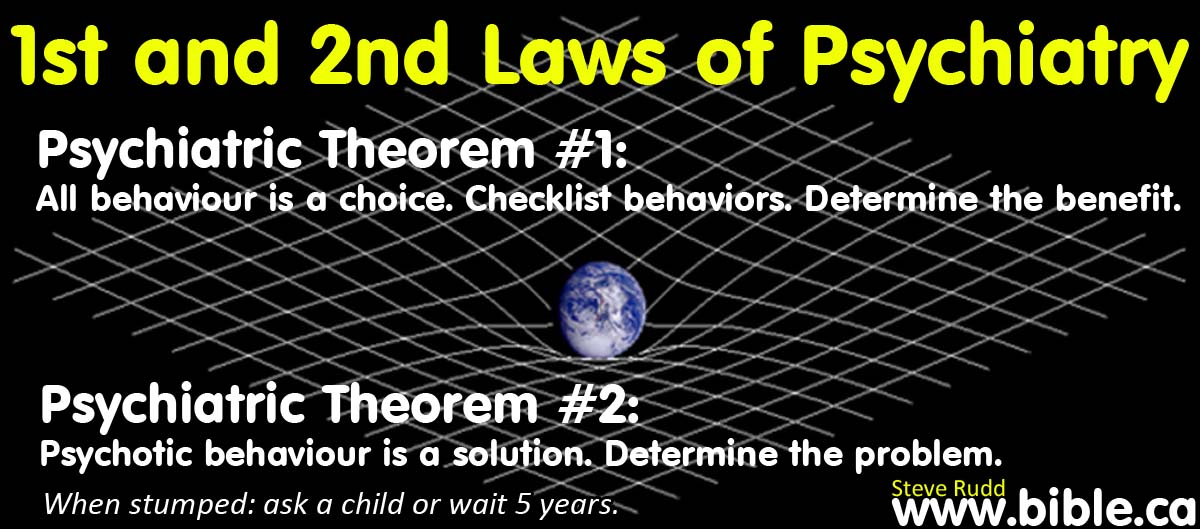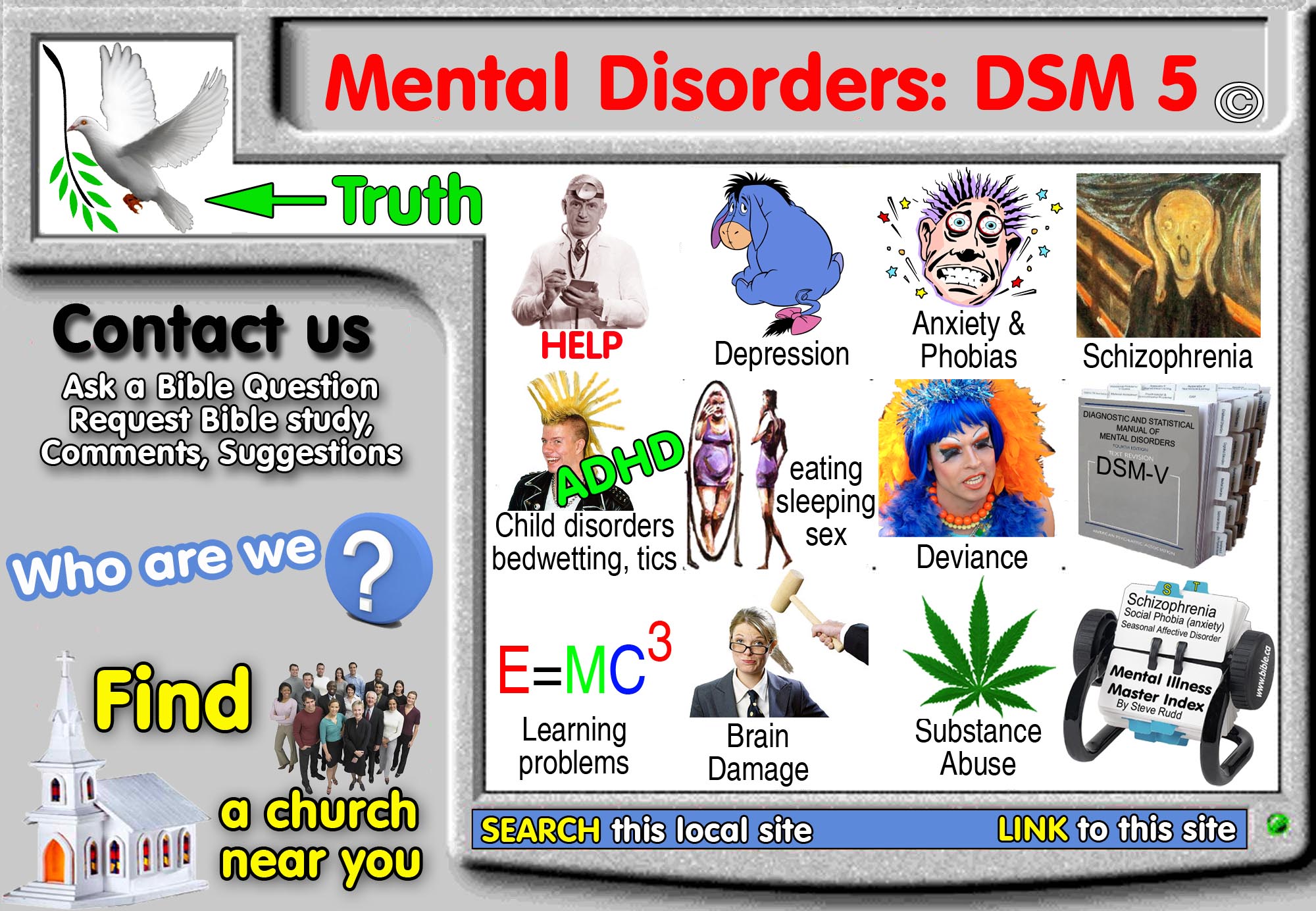The case of "Deferred" (Hysteria, sickness, anxiety, depression triggered by a delay in her wedding.)
Casebook of Biblical Psychiatry © Version 7 (CBP-7)
|
Based upon |
Casebook of Biblical Psychiatry© brings the principles of Biblical Psychiatry to life based upon real-world cases and familiarizes Christians with different types of situations. This practical companion volume to Biblical Psychiatry© includes not only diagnosis, but also in-depth discussions by experienced Christians for Biblical approaches to treatment. This meticulously detailed volume of dynamic real-life case studies is simply a "must read" for all clinical Psychiatrists, mental health care professionals and Christians interested in expert opinion on today's treatment approaches. Psychiatric students, educators, and practitioners—as well as social workers, nurses, medical physicians, and interested laypersons—will find this unique volume of inestimable value in their day-to-day work.
|
|
|
|
|
The case of (Hysteria, sickness, anxiety, depression) |
|
|
|
|||||
|
|
The case of "Deferred" |
||||
|
|
Biopsychiatric labels DSM-5 |
Hysteria, anxiety, depression |
|||
|
|
Checklist Behaviours DSM-7 |
Selfishness, uncontentment, anxiety, depression, duty shirking |
|||
|
|
Insights MMPI-7 |
|
|||
|
|
Quick Pick EDS-7.1 |
Complaints: I feel Unhappy |
|||
|
|
Self-disablement EDS-7.2 |
Duty shirking, making herself sickly, dependent |
|||
|
|
Chemical imbalance EDS-7.3 |
No. Never ingested opium. Although before the era of prescribed psychiatric drugs (1950's) which create chemical imbalances in the brain, at this point in history Opium was the only drug widely used to create chemical imbalances in the brains of the insane. |
|||
|
|
Benefits EDS-7.4 |
Attention seeking, Pride, Praise, Honour, Fame: EDS-7.4.3 Escape duty or life situation: EDS-7.4.4 Sympathy: EDS-7.4.5 Control over others: EDS-7.4.6 Victimhood: EDS-7.4.13 |
|||
|
|
Monetary EDS-7.5 |
- |
|||
|
|
Annoyance Scale EDS-7.6 |
Low |
|||
|
|
Diagnostic Laws EDS-7.7 |
Law of Narcissistic Behaviour Choice (NBC) EDS-7.7.1.NBC Law of Derivative Personal Benefit (DPB) EDS-7.7.2.DPB Law of Manipulative Rhetorical Malingering (MRM) EDS-7.7.9.MRM |
|||
|
|
Determine the Problem |
Unhappy her wedding was deferred |
|||
|
|
Ask a Child |
||||
|
|
5 years later EDS-7.7.LPT |
||||
|
|
|
||||
The Case of "Deferred"
Robert Brudenell Carter, 1853 AD: An engaged woman makes herself sickly, depressed and anxious when her wedding day was delayed for years. She suddenly became psychotic the day she learned of her younger sister's imminent wedding.
Miss A—, aged 25, a resident in London, had been engaged for several years, and had suffered, both in health and spirits, from the continued postponement of her marriage. She went to visit some country friends, in whose society she was able to forget her cares and to regain her strength, so that she came back to town much better than she had left it, and, indeed, in a state of perfect health. But during her absence from home, a younger sister had accepted a matrimonial offer, the fulfillment of which was arranged to take place very speedily. On her return, Miss A— found the intended bridegroom staying in her mother's house; and thus had her sister's prospects of immediate happiness suddenly placed before her, to be mentally contrasted with her own disappointments and anxiety. She had only been about an hour in a railway carriage [she had just completed a 1 hour trip and was now home], but expressed herself as being tired by her journey, and sat in silence, apart from the rest of the family group, dwelling upon the conflicting emotions called up by the scene before her. After doing so for about an hour, she rose from her seat, saying that she felt poorly, and, making a great effort at self-command, she tried to leave the room, but was stopped by an hysteric paroxysm [wild and physical outburst of emotion] before this object could be accomplished. It was not very violent, for, after a short period of sobbing and irregular movements, a copious flow of tears took place; and being then laid upon a bed, she soon cried herself to sleep. The next morning she did not feel anything amiss, and had not lost any of the benefits which had accrued to her from change of air and scene. (On the Pathology and Treatment of Hysteria, Robert Brudenell Carter, 1853 AD, p 31)
Discussion:
This is a classic case of hysteria. She was unhappy with her life situation and had actually made herself sickly, depressed and anxious for quite a period of time. Her psychotic fit on the floor with "epileptic-like" body movements were all behaviour choices. Had this behaviour continued for more than a few days, she would have been taken to an asylum.
Given her history of pouting because she did not get what she wanted (marriage), the psychotic outburst was just more of the same behaviour, but with elevated intensity. Fortunately, in the morning, she regained her self-control but likely continued with her depression. Marriage would not likely "fix" her behaviour problem (depression) for she would merely find a new reason to engage in the same behaviour for a new reason. Perhaps the man was smart enough to understand this and for this reason the man delayed marrying the woman precisely because she was prone to using manipulative behaviours like depression (pouting) to get her own way.
Benefits from behaviour: This illustrates the Law of Narcissistic Behaviour Choice (NBC) EDS-7.7.1.NBC
- Attention seeking, Pride, Praise, Honour, Fame: EDS-7.4.3. Her depression and anxiety would attract attention to her unhappiness that she wanted to be married.
- Escape duty or life situation: EDS-7.4.4. Her depression and anxiety was a way of escaping and coping with her problem. It also allowed her to be relieved of her duties, since she was sickly.
- Sympathy: EDS-7.4.5. Her depression and anxiety were a desire for sympathy.
- Control over others: EDS-7.4.6. She used her depression and anxiety as a way of trying to control those around her and her gallivanting groom into marrying her.
5. Victimhood: EDS-7.4.13. Although it was simply a deferment in her wedding, her behaviours were way of the balance with the actual problem. You would think something really bad had happened to her, when it was just a pouty female throwing a hissy fit because she wanted to start buying the stuff in her bridal magazine for real! She portrayed herself as a victim when she was the one really causing her own problems. The very behaviour of sickly depression and anxiety were likely the very behaviours what kept the groom at a distance. She was saying to her groom, "See what you are doing to me by not marrying me!" His reply was, "And I want to marry a woman who fabricates such sickly depression and anxiety? I need to see you be normal for at least 6 months before I set a date." She had difficulty seeing her own contributions to her own problems.
Diagnostic laws that are seen illustrated in the case of "Deferred":
- She had calculated that walking around in a sickly pout was worth the benefit of advertising her unhappiness for the purpose of sympathy and special privileges. This illustrates the Law of Derivative Personal Benefit (DPB) EDS-7.7.2.DPB
2. She had likely told him many times, "Let's hurry up and get married" and it didn't work. So she manufactured a set of behaviours that could ask him to marry her without words. She quit nagging him to marry her with words but started nagging him to marry her with her sickly depression and anxiety. This illustrates the Law of Manipulative Rhetorical Malingering (MRM) EDS-7.7.9.MRM
By Steve Rudd: Contact the author for comments, input or corrections.
Send us your story about your experience with modern Psychiatry


